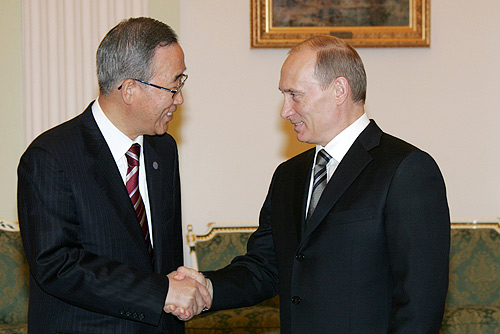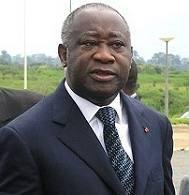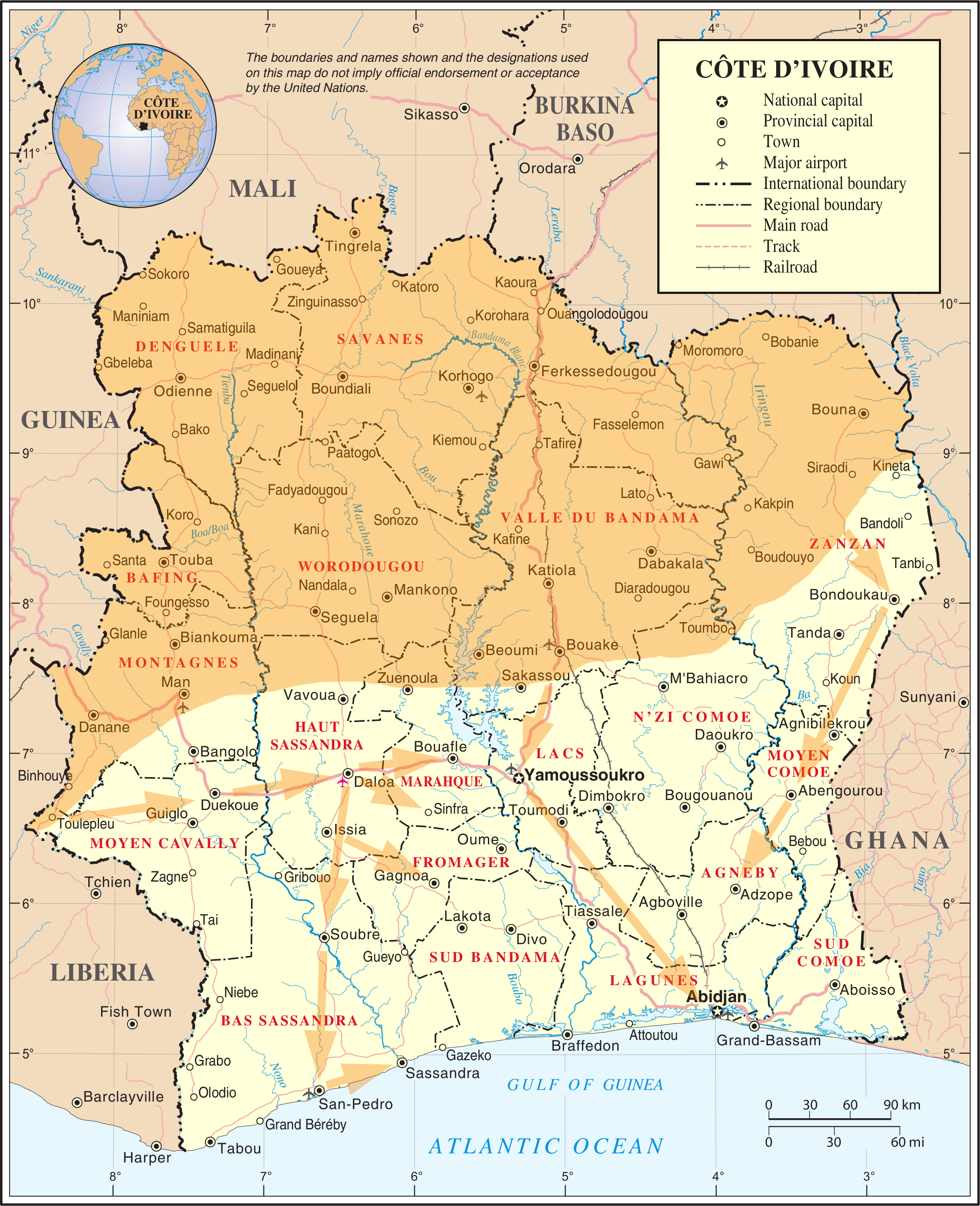|
United Nations Security Council Resolution 1968
United Nations Security Council Resolution 1968, adopted unanimously on February 16, 2011, after recalling previous resolutions on the situation in Côte d'Ivoire (Ivory Coast), including resolutions 1933 (2010), 1942 (2010), 1946 (2010), 1951 (2010), 1962 (2010) and 1967 (2011), the Council extended the deployment of troops from the United Nations Mission in Liberia (UNMIL) to the United Nations Operation in Côte d'Ivoire (UNOCI) for an additional three months. The Council recalled inter-mission co-operation agreements outlined in resolutions 1609 (2005) and 1938 (2010). At the same time, it also reiterated that it could authorise the Secretary-General Ban Ki-moon to send additional troops if necessary. Acting under Chapter VII of the United Nations Charter, the Council authorised the temporary redeployment from UNMIL to UNOCI of three infantry companies, one aviation unit and five helicopters for a further three months. It also urged support from police and troop-contri ... [...More Info...] [...Related Items...] OR: [Wikipedia] [Google] [Baidu] |
United Nations
The United Nations (UN) is an intergovernmental organization whose stated purposes are to maintain international peace and international security, security, develop friendly relations among nations, achieve international cooperation, and be a centre for harmonizing the actions of nations. It is the world's largest and most familiar international organization. The UN is headquarters of the United Nations, headquartered on extraterritoriality, international territory in New York City, and has other main offices in United Nations Office at Geneva, Geneva, United Nations Office at Nairobi, Nairobi, United Nations Office at Vienna, Vienna, and Peace Palace, The Hague (home to the International Court of Justice). The UN was established after World War II with Dumbarton Oaks Conference, the aim of preventing future world wars, succeeding the League of Nations, which was characterized as ineffective. On 25 April 1945, 50 governments met in San Francisco for United Nations Conference ... [...More Info...] [...Related Items...] OR: [Wikipedia] [Google] [Baidu] |
Ban Ki-moon
Ban Ki-moon (; ; born 13 June 1944) is a South Korean politician and diplomat who served as the eighth secretary-general of the United Nations between 2007 and 2016. Prior to his appointment as secretary-general, Ban was his country's Minister of Foreign Affairs and Trade between 2004 and 2006. Ban was the foreign minister of South Korea between 2004 and 2006. Ban was initially considered to be a long shot for the office of Secretary-General of the United Nations however, he began to campaign for the office in February 2006. As the foreign minister of South Korea, he was able to travel to all the countries on the United Nations Security Council, a maneuver that subsequently turned him into the campaign's front runner. On 13 October 2006, he was elected as the eighth secretary-general by the United Nations General Assembly. On 1 January 2007, he succeeded Kofi Annan. As secretary-general, he was responsible for several major reforms on peacekeeping and UN employment practice ... [...More Info...] [...Related Items...] OR: [Wikipedia] [Google] [Baidu] |
2011 In Ivory Coast
The following lists events that happened during 2011 in Ivory Coast. Incumbents *List of heads of state of Ivory Coast, President: ** Laurent Gbagbo (until April 11) ** Alassane Ouattara *List of heads of government of Ivory Coast, Prime Minister: ** Guillaume Soro ** Gilbert Aké (until April 11) Events January * January 1 - Mass graves are discovered in Côte d'Ivoire amid other political violence as United Nations peacekeepers come under increased tension in the country when allies of Alassane Ouattara call for a forceful removal of Laurent Gbagbo. * January 2 - 2010–11 Ivorian crisis ** Laurent Gbagbo's "Street General" postpones plans for its youth militia to storm the Golf Hotel, where Alassane Ouattara is currently staying, the area surrounded by the New Forces. Supporters of Ouattara renew calls to depose Gbagbo by military intervention. ** Thousands of refugees flee Ivory Coast to neighbouring countries; at least 18,000 of them to Liberia. * January 3 - A delegation ... [...More Info...] [...Related Items...] OR: [Wikipedia] [Google] [Baidu] |
2011 United Nations Security Council Resolutions
Eleven or 11 may refer to: *11 (number), the natural number following 10 and preceding 12 * one of the years 11 BC, AD 11, 1911, 2011, or any year ending in 11 Literature * ''Eleven'' (novel), a 2006 novel by British author David Llewellyn *''Eleven'', a 1970 collection of short stories by Patricia Highsmith *''Eleven'', a 2004 children's novel in The Winnie Years by Lauren Myracle *''Eleven'', a 2008 children's novel by Patricia Reilly Giff *''Eleven'', a short story by Sandra Cisneros Music * Eleven (band), an American rock band * Eleven: A Music Company, an Australian record label *Up to eleven, an idiom from popular culture, coined in the movie ''This Is Spinal Tap'' Albums * ''11'' (The Smithereens album), 1989 * ''11'' (Ua album), 1996 * ''11'' (Bryan Adams album), 2008 * ''11'' (Sault album), 2022 * ''Eleven'' (Harry Connick, Jr. album), 1992 * ''Eleven'' (22-Pistepirkko album), 1998 * ''Eleven'' (Sugarcult album), 1999 * ''Eleven'' (B'z album), 2000 * ''Eleven'' (Rea ... [...More Info...] [...Related Items...] OR: [Wikipedia] [Google] [Baidu] |
List Of United Nations Security Council Resolutions 1901 To 2000
This is a list of United Nations Security Council Resolutions 1901 to 2000 adopted between 16 December 2009 and 27 July 2011. See also * Lists of United Nations Security Council resolutions * List of United Nations Security Council Resolutions 1801 to 1900 * List of United Nations Security Council Resolutions 2001 to 2100 This is a list of United Nations Security Council Resolutions 2001 to 2100 adopted between 28 July 2011 and 25 April 2013. See also * Lists of United Nations Security Council resolutions * List of United Nations Security Council Resolutions ... {{United Nations *1901 ... [...More Info...] [...Related Items...] OR: [Wikipedia] [Google] [Baidu] |
Ivorian Presidential Election, 2010
Presidential elections were held in Ivory Coast in 2010. The first round was held on 31 October, and a second round, in which President Laurent Gbagbo faced opposition leader Alassane Ouattara, was held on 28 November 2010. Originally scheduled to be held in 2005, the vote was delayed several times due to the Ivorian Civil War and difficulties involved in the organization and preparation of the elections. A peace agreement between the government and the former rebel New Forces was signed on 4 March 2007,"Ivorian president vows to hold elections as scheduled" Xinhua (''People's Daily''), 10 July 2007. and in late April 2009, it was announced that the elections would be held by 6 December 2009, and that the date would be announced shortly. On 15 May 2009, the date was announced to be 29 N ... [...More Info...] [...Related Items...] OR: [Wikipedia] [Google] [Baidu] |
Ivorian Parliamentary Election, 2011
Parliamentary elections were held in Ivory Coast on 11 December 2011, after the presidential elections in late 2010. They followed a peace agreement between the government and the New Forces (former rebels) that was signed in March 2007."Ivorian president vows to hold elections as scheduled" Xinhua (''People's Daily Online''), July 10, 2007. The , the party of President , won just under half the seats in the |
Second Ivorian Civil War
The Second Ivorian Civil War broke out in March 2011 when the crisis in Ivory Coast escalated into full-scale military conflict between forces loyal to Laurent Gbagbo, the President of Ivory Coast since 2000, and supporters of the internationally recognised president-elect Alassane Ouattara. After months of unsuccessful negotiations and sporadic violence between supporters of the two sides, the crisis entered a critical stage as Ouattara's forces seized control of most of the country with the help of the UN, with Gbagbo entrenched in Abidjan, the country's largest city. International organizations have reported numerous instances of human rights violations by both sides, in particular in the city of Duékoué where Ouattara's forces killed hundreds of people. Overall casualties of the war are estimated around 3000. The UN and French forces took military action, with the stated objective to protect their forces and civilians. France's forces arrested Gbagbo at his residence on 1 ... [...More Info...] [...Related Items...] OR: [Wikipedia] [Google] [Baidu] |
2010–2011 Ivorian Crisis
The 2010–11 Ivorian crisis was a political crisis in Ivory Coast which began after Laurent Gbagbo, the President of Ivory Coast since 2000, was proclaimed the winner of the Ivorian election of 2010, the first election in the country in 10 years. The opposition candidate, Alassane Ouattara, and a number of countries, organisations and leaders worldwide claimed Ouattara had won the election. After months of attempted negotiation and sporadic violence, the crisis entered a decisive stage as Ouattara's forces began a military offensive in which they quickly gained control of most of the country and besieged key targets in Abidjan, the country's largest city. At the time, international organizations reported numerous human rights violations, and the UN undertook its own military action with the stated objective to protect itself and civilians. A significant step in bringing an end to the crisis occurred on 11 April 2011 upon the capture and arrest of Gbagbo in Abidjan by pro-Ouat ... [...More Info...] [...Related Items...] OR: [Wikipedia] [Google] [Baidu] |
People's Daily
The ''People's Daily'' () is the official newspaper of the Central Committee of the Chinese Communist Party (CCP). The newspaper provides direct information on the policies and viewpoints of the CCP. In addition to its main Chinese-language edition, the ''People's Daily'' is published in multiple languages. History The paper was established on 15 June 1948 and was published in Pingshan, Hebei, until its offices were moved to Beijing in March 1949. Ever since its founding, the ''People's Daily'' has been under direct control of the CCP's top leadership. Deng Tuo and Wu Lengxi served as editor-in-chief from 1948 to 1958 and 1958–1966, respectively, but the paper was in fact controlled by Mao Zedong's personal secretary Hu Qiaomu. During the Cultural Revolution, the ''People's Daily'' was one of the few sources of information from which either foreigners or Chinese could figure out what the Chinese government was doing or planning to do. During this period, an editorial in t ... [...More Info...] [...Related Items...] OR: [Wikipedia] [Google] [Baidu] |
Alassane Ouattara
Alassane Dramane Ouattara (; ; born 1 January 1942) is an Ivorian politician who has been President of Ivory Coast (Côte d'Ivoire) since 2010. An economist by profession, Ouattara worked for the International Monetary Fund (IMF)"Ivory Coast's Alassane Ouattara in profile" , , 11 April 2011. and the (french: Banque Centrale des Etats de l'Afrique de l'Ouest, BCEAO), and he was the |
Laurent Gbagbo
Koudou Laurent Gbagbo , FPI website . ( Gagnoa Bété: ; ; born 31 May 1945) is an Ivorian politician who was the President of Côte d'Ivoire from 2000 until his arrest in April 2011. A historian, Gbagbo was imprisoned in the early 1970s and again in the early 1990s, and he lived in exile in France during much of the 1980s as a result of his union activism. Gbagbo founded the (FPI) in 1982 and ran unsuccessfully for president against |




